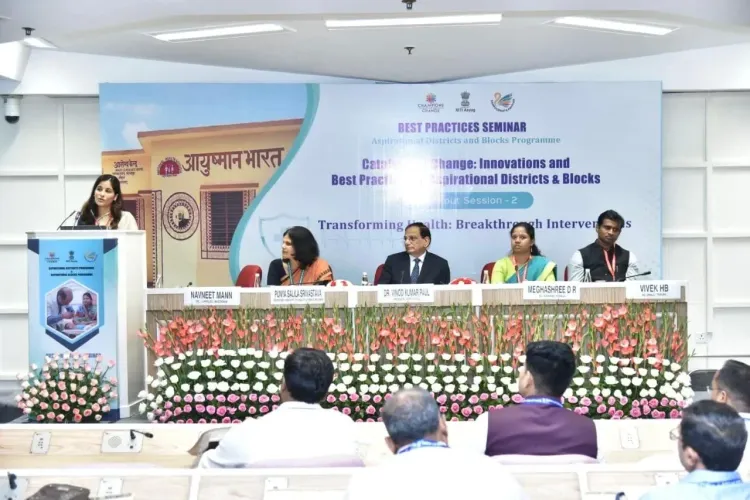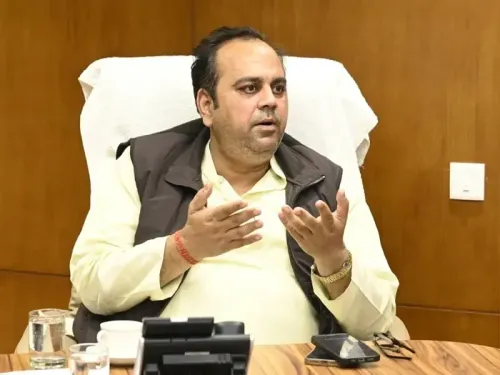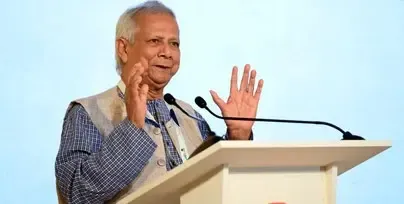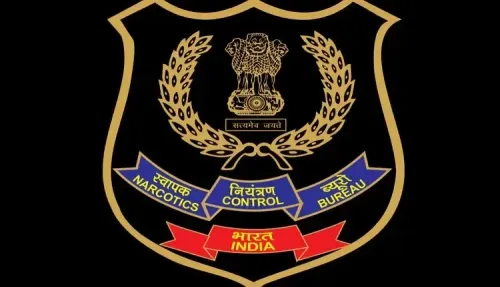How Did Mizoram's 'Project BLOOM' Achieve National Recognition for Maternal and Child Healthcare?

Synopsis
Key Takeaways
- Project BLOOM is a transformative maternal and child health initiative.
- Launched on June 17, 2025, it addresses critical health challenges.
- Community participation is key to its success.
- Significant improvements in health indicators have been recorded.
- The project exemplifies innovative health solutions in rural areas.
Aizawl, Aug 8 (NationPress) The Lunglei district administration in Mizoram has received national recognition for its leading maternal and child health initiative, Project BLOOM, showcased at the 'Best Practices Seminar' organized by the NITI Aayog at Vigyan Bhawan in New Delhi, as confirmed by officials on Friday.
The seminar highlighted successful interventions from 329 aspirational districts and 500 aspirational blocks nationwide.
An official statement revealed that under the theme "Transforming Health: Breakthrough Interventions", Lunglei Deputy Commissioner Navneet Mann presented the Project BLOOM (Better Living through Outreach, Optimal Maternal and Child Health) as one of the 19 selected best practices.
Initiated on June 17, 2025, Project BLOOM targets maternal and child health issues in the Lungsen aspirational block of Lunglei district.
The area, characterized by challenging terrain, high logistical costs, limited internet access, and gaps in health awareness, has historically faced low health indicators. The project's goal is to bridge these gaps through a community-focused, convergence-based strategy that combines health, nutrition, transport, and behavioral change.
As part of the Safe Womb Wheels initiative, Project BLOOM has implemented an on-call transport service for high-risk pregnancies in remote villages to ensure timely referrals to the District Hospital.
The project also established 12 temporary homestays near delivery points, hosted by local villagers, providing essential accommodation and support until delivery, with incentives for host families.
To identify pregnant women and malnourished children, house-to-house surveys were conducted to create a comprehensive data source for interventions. Incentives are offered to encourage early antenatal care (ANC) registration and institutional deliveries, including nutrition and hygiene kits.
Project BLOOM has launched awareness campaigns targeting men, job cardholders, self-help groups, and religious leaders to promote maternal health practices.
Other initiatives under this flagship project include monitoring and follow-ups with Rs 5,000 worth of nutrition support based on prescribed diet charts, targeting hard-to-reach villages with micro-planning, and aligning with Mission Indradhanush. Special follow-ups and timely referrals are conducted through outreach camps under the PM Surakshit Matritva Abhiyan, along with regular training for ASHA, Anganwadi, health workers, and local dais, focusing on skilled birth assistance.
The official statement emphasized that Project BLOOM has significantly transformed the maternal and child health landscape of the Lungsen block.
Institutional deliveries rose from 14.73% in March 2023 to 43.14% in March 2025, reaching 72.2% by June-July 2025, surpassing the 70% threshold for the first time.
Early ANC registration (first trimester) improved from 50.6% (March 2023) to 68.14% (March 2025), and further to 70% (July 2025).
The percentage of pregnant women receiving supplementary nutrition under Integrated Child Development Services increased from 11.3% (March 2023) to 81.9% (July 2025).
For children aged between six months and six years, the rate of receiving supplementary nutrition grew from 6.16% to 75% during the same timeframe.
Lungsen is one of four rural development blocks in Lunglei district, covering an area of 424.04 square km, with a population of 18,637 across 24 village councils, inhabited by three communities: Mizo, Chakma, and Reang, living in harmony.
Through Project BLOOM, the Lunglei district exemplifies how convergence, innovation, and community engagement can enhance health outcomes in remote and challenging areas. By fostering healthier mothers and children, this flagship project lays the groundwork for stronger, more resilient communities in Mizoram.










